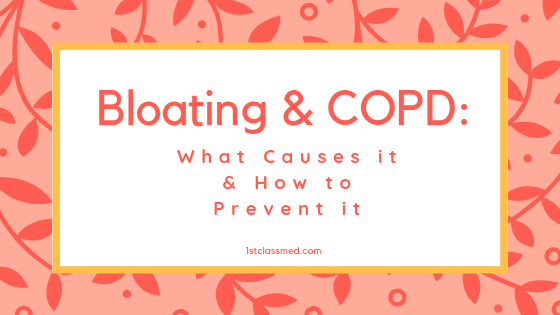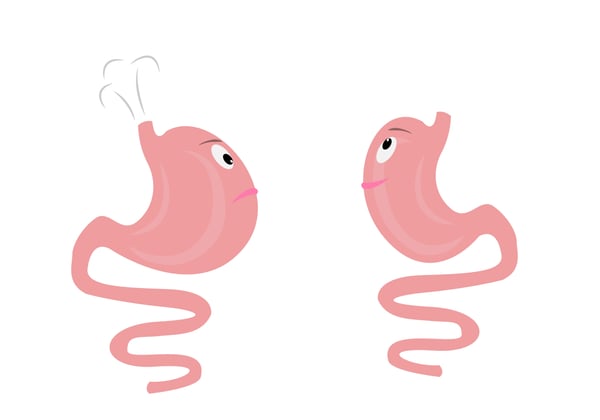
Bloating is when your stomach feels full and abdominal distension (a term your doctor may use) is when your stomach physically looks bloated.
These terms are occasionally interchanged but do have two different meanings.
The gas buildup that causes bloating often occurs from inadequate or irregular fiber and water consumption.
Gas is a by-product of fiber digestion, but there are two types of fiber, soluble and insoluble fiber.
Soluble fiber is fermented in the colon and turns into gas and insoluble fiber absorbs liquids in the body (such as water) and helps the body defecate.
Gas in the bowel is caused by two things, swallowed air or bacteria that naturally occurs in the intestine and colon that can cause gas.
Swallowed air can be from eating too quickly or accidentally swallowing air and bacteria in the intestines and colon can cause additional gas as well.
Severe stomach conditions such as IBS can be the cause of bloating in many people as well, so check with your doctor or visit a gastroenterologist to pinpoint the cause of bloating for you.
How Bloating & COPD Connect

COPD is often associated with coughing, shortness of breath and other lung conditions, but it is not well known that stomach problems can be associated with COPD as well.
Though a lot of the population suffers with bloating, it can be even more painful for those with COPD, as it bloating can cause more pressure and pain when breathing.
Many with COPD report bloating and feeling full fast, preventing nutrients from getting to the body.
Doctors and researchers have been unable to pinpoint the cause of bloating in COPD patients, but there are a few possible causes of why it happens.
There are a few theories behind COPD bloating, such as long lungs, inactivity/lack of exercise, difficulty breathing, medications, and diet.
Long lungs are when the lungs become hyperinflated and slowly lose elasticity, as a result they become unable to completely exhale every breath.
The lungs expand to try and compensate for the lack of elasticity, this expansion can push down on the stomach.
The expansion of the lungs is to try and make more room for oxygen, as you slowly lose the ability to fully exhale every breath which results in oxygen being left in the lungs.
The nickname for hyperinflated lungs are “long lungs”, which can push down on the diaphragm, condensing the stomach and intestines leading to the feeling of bloating.
The more our lungs inflate, the less room there is in the torso for our stomach and intestines, so though it once may have been easy to eat an entire meal, as your lungs expand you may not be able to eat that same meal in one sitting.
As we are often mouth breathers it is important to try and switch to nose breathing as it can help you breathe better and at a slower pace, causing less strain on your lungs and diaphragm.
Breathing slower can make you feel better, as you can calmly breathe in air versus feeling like you are struggling to breathe.
Inactivity or lack of exercise can add to the feeling of being tired and breathless, which can lead to the feeling of bloating as well.
Exercise can help strengthen the lungs, but when you do not exercise enough, or at all, your lungs slowly lose elasticity and can become weak.
On top of that, difficulty breathing, commonly associated with COPD, can increase the feeling of bloating.
It works the other way around too, as bloating can increase the feeling of breathlessness.
Some COPD medications can cause constipation, which can in turn lead to bloating as well.
If you food is backed up in your intestines and stomach, it is harder for your body to expel gas, leaving it trapped in your stomach.
This can then cause the feeling of bloating and uneasiness in the stomach.
Diet also plays a role in bloating, as a large meal or carbonated drinks can both cause bloating.
Our bodies process food and drinks in an odd way, which can cause excess gas from digesting and processing food.
What Can You Do
The top way to try and prevent bloating is to avoid certain foods and drinks, such as fried foods and carbonated drinks.
Fruits and vegetables that are known for causing gas, such as beans, broccoli, Brussels sports and cabbage should all be eaten minimally in order to prevent bloating.
When you eat, try to eat very slow and wait to drink until after you are done eating, this should prevent bloating.
Or try eating 5 small meals versus 3 large meals in order to get nutrition from your food versus getting full before you get to your nutritious foods.
There are prescription medications and over the counter medications to help with bloating but consult your doctor before you begin to take any medications.
Exercise, such as walking, can help pass gas that is trapped in your stomach, which can ease the bloating.
Pulmonary rehabilitation can help you breathe better and strengthen the lungs, putting less pressure on the stomach.
If you feel that your medications are affecting your stomach, speak with your doctor about switching medications or other steps you can take to help your stomach.
Your pharmacist may also be able to help you narrow down what medication is causing your stomach to be uneasy and can recommend what to do to help the bloating lessen.
Probiotics can also help your bloating, as it can help balance bacteria in the intestines and colon, making your stomach less uneasy.
You can take probiotic pills or get yogurt that has added probiotics to get a daily dose of probiotics, but make sure to talk with your doctor about dosage.
![]()
Conclusion
Though it can seem like there are no others with the same issues, there are plenty of people with COPD and bloating and no cause as to why.
Doctors are trying to find a solution, but it can be hard to pinpoint the cause for a general population versus individually.
It is important to first find the cause of your bloating and then decide what treatment should be taken in order to lessen the effects of bloating.
It can be as simple and tweaking your diet, or as extreme as exercise and supplements.
Your doctor can have the best solution for you personally, as the cause can be different for everyone.



